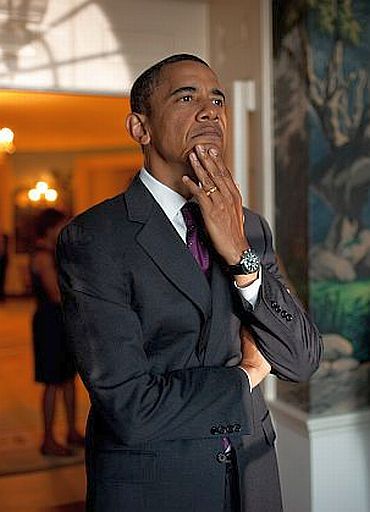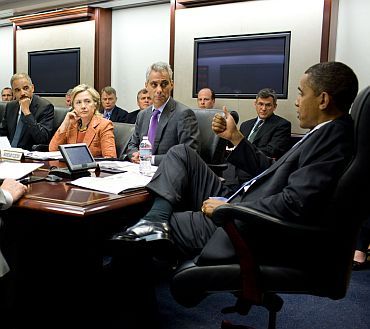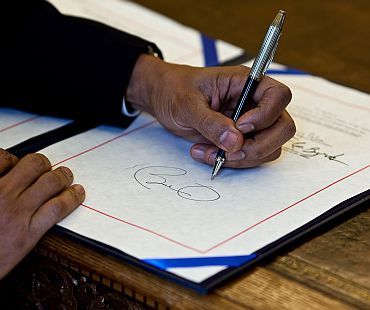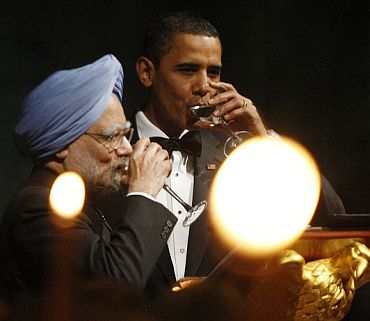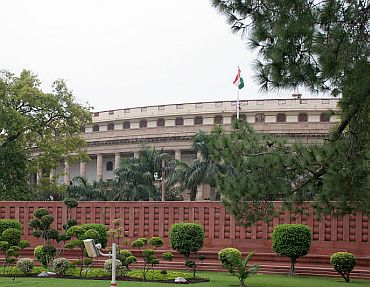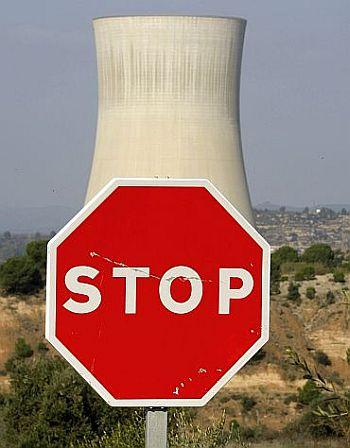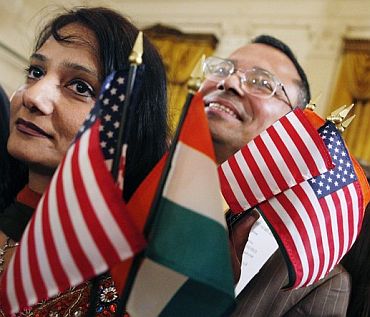 | « Back to article | Print this article |
Here's what Obama and Dr Singh should do
On the eve of US President Barack Obama's visit to India next month, a new report has urged, as a top priority, that the US unambiguously and unequivocally endorse New Delhi's bid for a permanent seat in the United Nations.
The report has been prepared by a bipartisan study group of experienced South Asia hands who served in senior policymaking positions in the Clinton and George W Bush administrations and previous Democratic and Republican governments.
The report said, "As the United States and India build a strategic relationship in the years and decades ahead, the two countries must cooperate more closely within international bodies," and bemoaned that "today, the UN Security Council quite plainly fails to reflect the distribution of power in today's world, and it does not take into account India's rise to global power status."
"As a result -- and in light of US aspirations for the US-India strategic partnership -- the United States should commit, publicly and explicitly, to work with India in support of its permanent membership in an enlarged UN Security Council," it exhorted.
The report, titled Natural Allies: A Blueprint for the Future of US-India Relations -- an advance copy of which was provided to rediff.com before its release later in the week -- is the outcome of eight months of meetings by this non-partisan working group that met under the aegis of the Centre for a New American Security to review the main pillars of the US-India relationship to articulate a specific agenda of action to move the envisaged strategic partnership forward.
Click on NEXT to read further...
Here's what Obama and Dr Singh should do
The group, co-chaired by former Deputy Secretary of State Richard Armitage and Under Secretary of State Nicholas Burns, who both served in the Bush administration, recommended that both Washington and New Delhi should seek "a broad expansion of bilateral trade and investment, beginning with a Bilateral Investment Treaty; greatly expand the security relationship and boost defence trade; support Indian membership in key export control organisations, a step toward integrating India into global non-proliferation efforts; and liberalise US export controls, including the removal of Indian Space Research Organization subsidiaries from the US Entity List."
The group acknowledged that these and other actions outlined in the report would also "require India to make a number of commitments and policy changes, including taking rapid action to fully implement the civil nuclear agreement; raising the caps on foreign investment; reducing barriers to defence and other forms of trade; enhancing its rules for protecting patents and other intellectual property; further harmonising its export control lists with multilateral regimes; and seeking closer cooperation with the United States and like-minded partners in international organisations, including the United Nations."
Here's what Obama and Dr Singh should do
The report predicted that "a strong US-India strategic partnership will prove indispensable to the region's continued peace and prosperity," as both New Delhi and Washington "have a vital interest in maintaining a stable balance of power in Asia."
"Neither seeks a containment of China, but the likelihood of a peaceful Chinese rise increases if it ascends in a region where the great democratic powers are also strong," it said, adding: "Growing US-India strategic ties will ensure that Asia will not have a vacuum of power and will make it easier for both Washington and New Delhi to have productive relations with Beijing."
The report argued that in addition, "A strengthened relationship with India, a natural democratic partner, will signal that the United States remains committed to a strong and enduring presence in Asia."
But it said, "The need for closer US-India cooperation goes well beyond regional concerns. In light of its rise, India will play an increasingly vital role in addressing virtually all major global challenges."
Here's what Obama and Dr Singh should do
Thus, the report reiterated that "now is the time to transform a series of bilateral achievements into a lasting regional and global partnership."
Meanwhile, on civil nuclear cooperation, the report warned that "failure to complete the steps necessary to implement the agreement," which it acknowledged "constituted a historic step forward in US-India ties and has become the cornerstone of the new partnership," would risk "severely damaging the rest of the relationship."
"Consequently, the United States and India must press vigorously for rapid implementation of the agreement," the group argued while noting that the nuclear liability law recently passed by the Indian parliament "deviates significantly from international standards and renders equipment suppliers potentially liable for as long as 80 years."
Here's what Obama and Dr Singh should do
The group said, "This law is a major disappointment to private and public officials in the United States," and called on New Delhi to "take quick and resolute action to resolve this issue."
"Failure to do so will undermine the most important agreement the two countries have negotiated and pose grave risks for the relationship at the political level, "it said.
On the subject of non-proliferation, the group in the report urged that 'building on past nuclear and non-proliferation achievements, the United States should further integrate India into the mainstream of global non-proliferation institutions'.
Here's what Obama and Dr Singh should do
"This should include unambiguous American support for India membership in multilateral export-control regimes, that is, the Nuclear Suppliers Group, the Australia Group, the Wassenaar Arrangement and the Missile Technology Control Regime."
The group's report also said that the US "should also cease calling for India to join the Nuclear Non-Proliferation Treaty as a non-nuclear state, as it has for many years. Rather, the United States should encourage India to fully conform its laws, policies, and practices to those of NPT members, irrespective of its non-member status."
"For its part, India should work closely with the United States and the rest of the international community to prevent Iran's development of nuclear weapons," it added.
Here's what Obama and Dr Singh should do
In its conclusion, the task force said that 'the recommendations in the report are based on the belief that the United States has an interest in working more closely with India and in assisting its further emergence as one of the world's great powers'.
But it said, "This will require policy changes by both the United States and India," and acknowledged that "many of these changes will be difficult, and some differences may endure."
However, the report argued, "The potential gain is worth the effort. Now is a critical time in this partnership, a moment to transform past bilateral accomplishments into regional and global successes."
"We urge American and Indian leaders to seize it," it exhorted.
